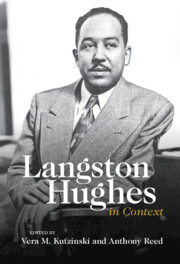Book contents
- Langston Hughes in Context
- Langston Hughes in Context
- Copyright page
- Contents
- Contributors
- Abbreviations
- Introduction
- Part I Singing America
- Part II The Global Langston Hughes
- Chapter 12 Langston Hughes and the Haitian Revolution
- Chapter 13 Taking Louise Bennett Seriously
- Chapter 14 Langston Hughes and Mexico
- Chapter 15 Langston Hughes in Spain
- Chapter 16 Langston Hughes in Cuba and South America
- Chapter 17 Langston Hughes, Colonialism, and Decolonization
- Chapter 18 Langston Hughes and Cultural Diplomacy
- Chapter 19 Langston Hughes in the Soviet Union
- Chapter 20 Translating Blackness
- Chapter 21 Langston Hughes and the Shanghai Jazz Scene
- Chapter 22 Langston Hughes’s Short Fiction in 1930s Korea
- Part III Afterlives
- Index
Chapter 16 - Langston Hughes in Cuba and South America
from Part II - The Global Langston Hughes
Published online by Cambridge University Press: 10 November 2022
- Langston Hughes in Context
- Langston Hughes in Context
- Copyright page
- Contents
- Contributors
- Abbreviations
- Introduction
- Part I Singing America
- Part II The Global Langston Hughes
- Chapter 12 Langston Hughes and the Haitian Revolution
- Chapter 13 Taking Louise Bennett Seriously
- Chapter 14 Langston Hughes and Mexico
- Chapter 15 Langston Hughes in Spain
- Chapter 16 Langston Hughes in Cuba and South America
- Chapter 17 Langston Hughes, Colonialism, and Decolonization
- Chapter 18 Langston Hughes and Cultural Diplomacy
- Chapter 19 Langston Hughes in the Soviet Union
- Chapter 20 Translating Blackness
- Chapter 21 Langston Hughes and the Shanghai Jazz Scene
- Chapter 22 Langston Hughes’s Short Fiction in 1930s Korea
- Part III Afterlives
- Index
Summary
Hughes did not travel in South America, and his contacts with fellow writers from the southern part of the hemisphere all began elsewhere, notably in Mexico, Spain, and Cuba. This chapter focuses on the circulation of the Spanish translations of Hughes’s poetry in the Hispanic Americas and on the different literary and political personae that Spanish-language translators and journalists constructed for him. For some, Hughes was the race-man celebrated as the purported progenitor of black poetry in the Hispanic world. For others, he was the black Marxist who wrote poetry in the service of global revolutionary politics. While Hughes played both roles at different times in his career, his dedication to black internationalism would eventually prove untenable in the Hispanic Americas.
Keywords
- Type
- Chapter
- Information
- Langston Hughes in Context , pp. 171 - 181Publisher: Cambridge University PressPrint publication year: 2022

